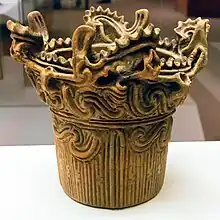Jōmon period
The Jōmon period ((縄文時代, Jōmon-jidai) is the time in Japanese prehistory which started in roughly 14,000 BC[1] to 10,000 BC.[2]
| History of Japan |
|---|
 |
|
The period ended in roughly 500 BC[3] or 400 BC[2] to 300 BC.
"Jōmon" means "patterns of plaited cord"[2] or "cord-patterned" [4] from the way they decorated their pottery. The Jōmon people were closely related to the ancestors of other East Asians, but became isolated on the Japanese archipelago in 15,000BCE and recived some geneflow from an European-related population from Siberia along a North to South cline. It is suggested that the Jōmon, like other East Asians and Native Americans, ultimately originated in Southeast Asia. Cultural similarities exist with Native Americans.[5][6][7]
Gallery
 Jōmon pottery
Jōmon pottery
Related pages
References
- Habu, Junko. (2004). Ancient Jomon of Japan, p. 42; "Jomon Fantasy: Resketching Japan's Prehistory," June 22, 1999. Retrieved 2011-12-14.
- Facts About Japan, "Ancient Japan" Archived 2016-11-04 at the Wayback Machine. Retrieved 2012-12-14.
- Kelly, Charles F. Jomon Culture," Japanese Archaeology. April 21, 2009. Retrieved 2011-12-14.
- Hall, John, Whitney. (1996). Ancient Japan, p. 270.
- (PDF) Jomon Culture and the peopling of the Japanese archipelago: advancements in the fields of morphometrics and ancient DNA. (https://www.researchgate.net/publication/281036097_Jomon_Culture_and_the_peopling_of_the_Japanese_archipelago_advancements_in_the_fields_of_morphometrics_and_ancient_DNA)
- 崎谷満『DNA・考古・言語の学際研究が示す新・日本列島史』(勉誠出版 2009年)(in Japanese)
- Cooke, Niall P.; Mattiangeli, Valeria; Cassidy, Lara M.; Okazaki, Kenji; Stokes, Caroline A.; Onbe, Shin; Hatakeyama, Satoshi; Machida, Kenichi; Kasai, Kenji; Tomioka, Naoto; Matsumoto, Akihiko (2021). "Ancient genomics reveals tripartite origins of Japanese populations". Science Advances. 7 (38): eabh2419. doi:10.1126/sciadv.abh2419. ISSN 2375-2548. PMC 8448447. PMID 34533991.
Other websites
![]() Media related to Jōmon period at Wikimedia Commons
Media related to Jōmon period at Wikimedia Commons
- University of Tokyo, Memory of the Jomon Period
- Niigata Prefectural Museum of History, The Prehistoric Archaeology of Japan Archived 2011-07-16 at the Wayback Machine